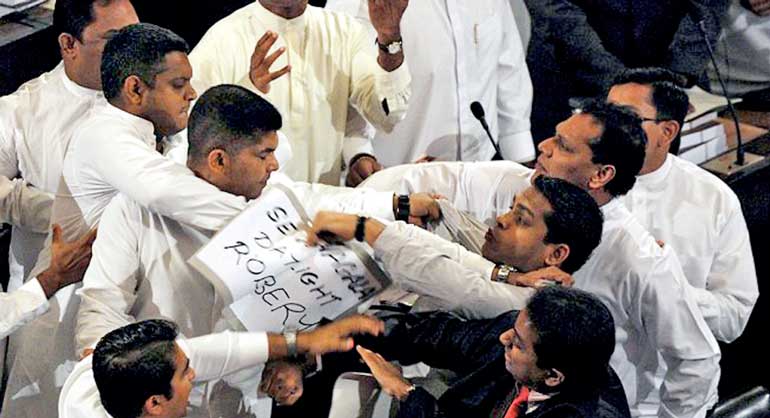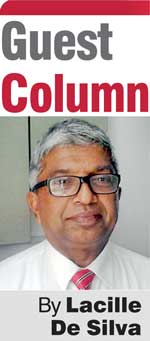Wednesday Feb 18, 2026
Wednesday Feb 18, 2026
Friday, 23 February 2018 00:00 - - {{hitsCtrl.values.hits}}

 The wrong people teach us the best lessons. As a clever nation, we had always used our ballot and chased the wrong people away when they nosedived. Despite taking a few progressive steps, such as improving the democratic space, the Government of Maithripala Sirisena and Ranil Wickremesinghe is a good case study for bad governance.
The wrong people teach us the best lessons. As a clever nation, we had always used our ballot and chased the wrong people away when they nosedived. Despite taking a few progressive steps, such as improving the democratic space, the Government of Maithripala Sirisena and Ranil Wickremesinghe is a good case study for bad governance.
There is disappointment and disillusionment all over. They have wasted three years in office. In Parliament too there appears to be major confusion. If the promised political reforms had been carried out credibly, i.e. the abolition of the executive presidency, elimination of corruption, returning to a parliamentary system of governance, etc. all that could have created a significant impact on the State and the culture of impunity and governance.
The Government failed to consider the need to look into promised economic revival, creation of employment and reduction of the cost of living. They ignored confidence-building measures while moving forward.
The Government also delayed local government elections, which has subsequently resulted in a political impasse, which is also an unwise creation by choice. Furthermore, they began losing the political will to investigate high-profile corruption cases and their mindset of taking legal action against perpetrators even before the expiry of their first year in office.
The first step in that direction was my removal from the Presidential Commission of Inquiry to Investigate and Inquire into Serious Acts of Fraud, Corruption and Abuse of Power, State Resources and Privileges (PRECIFAC) w.e.f 1 March 2016. All this no doubt was political bungling and has now bounced back on the Government, causing irreparable damage.
The legislative process in Sri Lanka is based on constitutional provisions and the Standing Orders adopted by Parliament in terms of Article 74 of the Constitution.
Standing Orders are the rules and guidelines for conducting the day-to-day business of the House in an orderly manner.
In Parliament, the Speaker, who is expected to act with impartiality and authority, on the guidance of the Secretary-General, should not allow the members to engage in politics. Parliamentary politics is necessarily permitted only if members fall in line with the rules, regulations and practices of parliamentary procedure.
The Speaker has the power to rule members guilty of ‘unparliamentary’ language and conduct and suspend members when they wilfully disobey orders, which is commonly called naming. Parliamentary practice is inherently procedural. Since we follow our mother Parliament, being a Westminster model parliamentary system, we need to rely greatly on it for reference and apply the processes, etc. in the ‘Treatise upon the Law, Privileges, Proceedings and Usages of Parliament’ through the Secretary-General on a daily basis.
And it is not meant to be kept under a pillow. It is an essential tool for understanding the foundational concepts of parliamentary practice and procedure and its guidance should be sought on a regular basis. Why don’t they apply the guidelines therein and prevent the parliamentary system from decay and destruction?
Thomas Erskine May (1815-1886), who had joined the House of Commons in the United Kingdom as Assistant Librarian in 1831 (at the age of 16), had risen up through the ranks, having eventually ended up as the most senior official, the Clerk of the House (1871-1886). He had been nominated to the staff by the then Speaker, Manners Sutton. Treatise written by May had been venerated with biblical solemnity since it was first published in 1844.
The Treatise had subsequently ceased to be the work of May. It is now an expression of the collective wisdom of the clerks throughout history. It is also an account of developments that had taken place in parliamentary practice and procedure. The clerks since the first identified clerk of the House of Commons could be described as multitasked doyens, such as the advice-giver to the Speaker, the Chief Executive Officer – a technocrat, to say the least.
In Sri Lanka too we continued with the same designation and it was subsequently re-designated in order to add more glamour and prestige as Secretary-General of Parliament.
May had strongly supported the rhetorical view of Parliament as an exemplary deliberative assembly and had praised the freedom of debate in the Westminster Parliament. The rules of Parliament had been designed to afford every legitimate opportunity for discussions, freedom of debate, generous regard for the liberty of individual members and tolerance within the walls of Parliament. He had added that the members nevertheless could be interrupted during the debate by crying “Order! Order!” if the debate was not in line with procedure.
I have seen with my own eyes, having been so very fortunate to serve the Parliament Secretariat for nearly three and a half decades, what happened and who destroyed the Supreme Institution - Parliament.
Parliamentary decline
In the first place, the Opposition became weak and opportunistic after the promulgation of the executive presidential system. The governments in power altered the structures and systems, quoting the war under emergency rule, which lasted several decades.
The floodgates had been opened for ruffians to enter politics. Party leadership overlooked and watered down the need to develop the fundamentals to ensure efficiency, effectiveness, accountability, responsiveness and transparency of the Supreme Institution – Parliament.
Politics became a lucrative business.
The new breed of politicos began showing a dislike and indifference towards their parliamentary duties. Absenteeism in committees became a very regular occurrence. They began defecting from their parties for money and ministerial positions. They started using ill-gotten money in politics, the underworld and muscle power because they lacked morality, character and decency.
Nevertheless, as trustees of people’s combined aspirations, Parliamentarians have a responsibility to forge new tools, develop new mechanisms and espouse human rights causes too. As emissaries of democracy, parliamentarians should also exercise oversight, accountability and transparency of both governmental and non-governmental spheres and ensure that both State and non-State actors do not waver from commitment to a human rights regime.
For this purpose primarily, we need the Speaker, the Secretary-General of Parliament, the Leader of the House, Chief Government Whip, Leader of the Opposition and most importantly the Prime Minister to initiate action to remove archaic procedures for a paradigm shift in order to strengthen the legitimacy of people’s representatives and the elected government.
At a huge cost, infrastructure was also provided for televising the proceedings, which too had been abandoned or curtailed. Reforms in my view are a sine qua non for making the Parliament effective and strong enough to achieve sustainable growth and development. They have misused their powers totally and failed to uplift the living standards of citizens.
Shouldn’t these be reviewed by the Parliament Secretariat itself? This can be achieved only if the Secretary-General of Parliament devotes his maximum time, effort and energy to constantly review the gamut of its procedures, processes and operations to guard against breakdown and decay from time to time.
I am sad the Parliament Secretariat is worryingly bureaucratic, excessively wasteful, heavily compartmentalised, pathetically mismanaged, sloppily unfocused and totally disoriented.
It is noteworthy that I began reforms during my days and these have now been shelved.
When I spoke to the former Speaker I was told: “I cannot do that, I am a politician.” It is therefore a heavily-neglected institution due to bureaucratic bungling. The most hilarious situation is the fact that the need for reforms in the Parliament Secretariat had been approved about a decade ago by the Staff Advisory Committee, an all-powerful committee comprising the Speaker (Chairman), Prime Minister, Minister of Finance and a few more individuals.
Parliament has also not used disciplinary and penal powers against unruly members for years. These powers have been granted to maintain discipline and to ensure sole control over all aspects of its own affairs to determine for itself the procedures. The Parliament has unquestioned authority to ensure parliamentary independence to serve the country and the people. All that is on paper in the Constitution and in other rule books and not beyond.
Parliament’s in-built powers
Parliament is a unique institution. It possesses in-built powers to deal with anyone who interferes or interrupts its legitimate functions to carry out its duties and responsibilities.
I give below a few interferences that could be considered and dealt with as contempt of Parliament:
Interrupting or disturbing the proceedings in the House
Assaulting, threatening, obstructing or intimidating a member or an officer in the House
Deliberately misleading the House by way of a speech, etc.
Deliberately publishing a false or misleading report of the proceedings of the House
Removing the Mace or a property of the House without authority
Deliberately suppressing information/documents required to be tabled in the House
Refusing to answer a question, provide information, produce documents, etc. required by the House
Disobeying a lawful order of the House
Giving/accepting bribes to change sides/parties
It is important to understand that the Parliament itself has created a culture of impunity within its precincts. Owing to all these shortcomings there is public cynicism towards the Parliament and the people’s representatives.
This is an unsatisfactory situation. Parliament belongs to the people. Parliament does not belong to MPs, the Speaker or the Secretary-General. Parliament is the mouthpiece and the link between the Government and citizens. Without personal and institutional accountability, can the Government credibly promote challenges before the country? It appears no effort has been made to find out the root causes that have eroded the respect and dignity that Parliament earned during the days of our forefathers.
There is no gainsaying the fact that in a society corrupt to the core, only a few – the conniving and the powerful – continue to enrich themselves. The poor become poorer. On the contrary, in morally sane countries like Australia, all who work hard, are dedicated, capable and disciplined can always make it to the top. It is unfortunate that even in the Parliament Secretariat such talented men are overlooked. Shouldn’t the Parliament Secretariat commence rewarding people based on merit without any further delay?
We need an army of politicians and an outfit of administrators with passion who think that in Sri Lanka they have a responsibility, which is vast and intricate, to take the country forward. Being a developing country for decades, where the majority do not get the minimum number of calories of their entitlements such as education, health, etc., the big men in politics and in top positions in the public sector should not gobble up the little men without any justification or mercy.
Dr. Abdul Kalam said: “Government’s money is people’s money. Don’t waste it. It is destructive. The country does not deserve anything less than success from us, let us aim for success.”